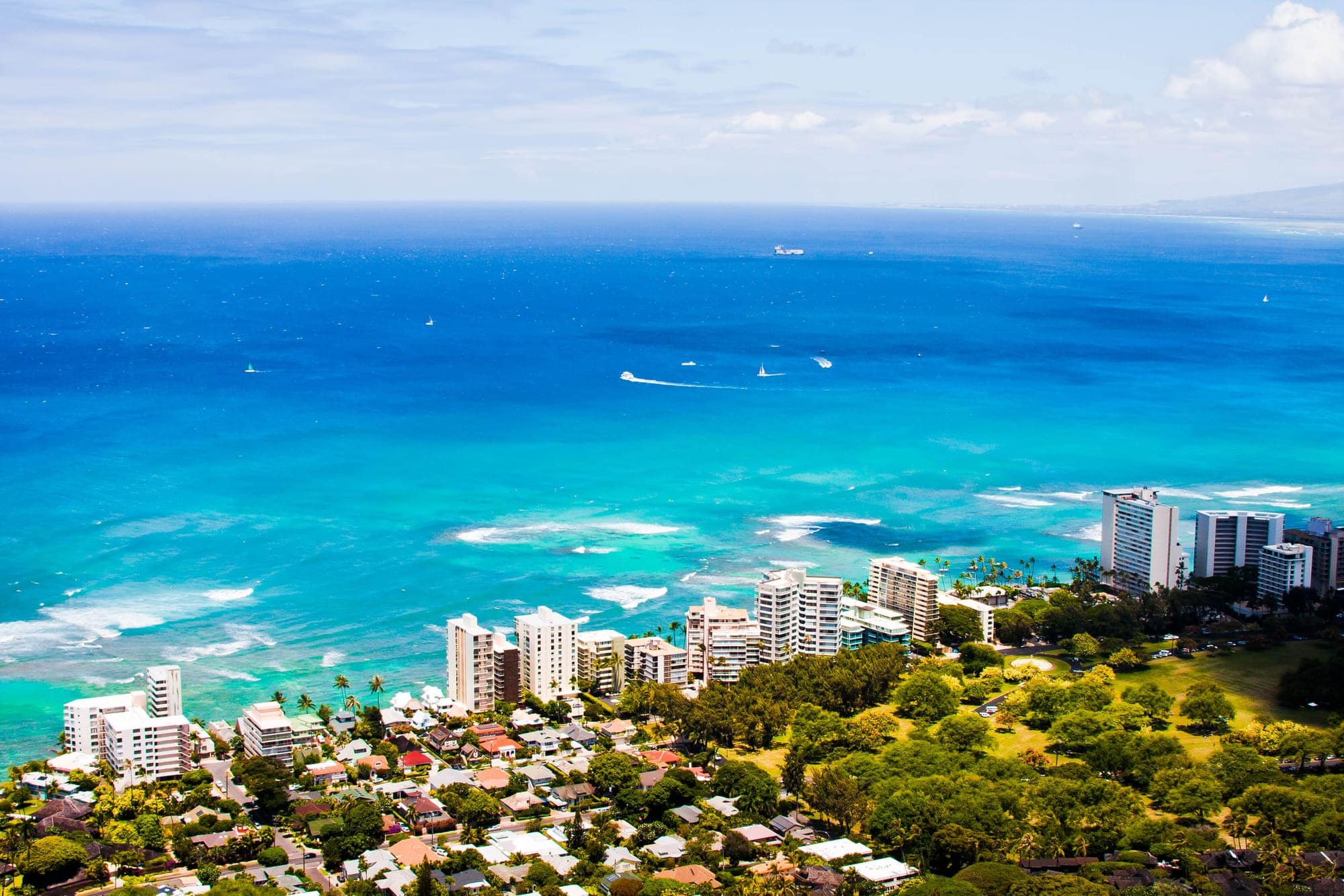Are you considering a move to the tropical paradise of Hawaii? As one of the most unique and picturesque locations in the United States, Hawaii offers a stunning blend of natural beauty, rich culture, and a laid-back island lifestyle that’s hard to resist.
In this comprehensive guide, we will cover all the crucial details, from the cost of living and housing market to the nuances of Hawaiian culture, education system, and healthcare facilities, offering a wealth of insight for your relocation journey.
Navigate the complexities of moving to Hawaii homes for sale with the help of this informative guide.
Moving to Hawaii? Here Is Your Guide To Everything You Need To Know
Moving to Hawaii is a gigantic life decision that involves careful consideration and thorough planning. While the island lifestyle, warm climate, and breathtaking nature can be incredibly appealing, it’s essential to acknowledge potential challenges.
Challenges of moving to Hawaii include the high cost of living, job market dynamics, and unique environmental factors like volcanic activity. This guide addresses these and more, helping you prepare for every aspect of your Hawaii relocation journey.
- Cost of Living: Understand the cost of living in Hawaii, including housing, food, and transportation expenses.
- Real Estate: Explore the Hawaii real estate market and evaluate housing options that cater to different budgets and lifestyle preferences.
- Job Opportunities: Get to know Hawaii’s job market, focusing on in-demand industries and job opportunities.
- Schools: Learn about the education system and the quality of public and private schools.
- Culture & Community: Familiarize with the Hawaiian culture and what to expect regarding social customs, community, and daily life.
Hawaii: A Tropical Paradise and Its Beginning
Hawaii, known for its unparalleled beauty and vibrant Hawaiian culture, has a rich history that has shaped it into the tropical paradise we know today. Initially inhabited by Polynesian voyagers who arrived on the islands around AD 300, Hawaii was a self-sufficient and prosperous kingdom for centuries.
The history of Hawaii as a U.S. state began in the late 19th century. The monarchy of Hawaii was overthrown in 1893 by a group of American businessmen. Hawaii was annexed by the United States in 1898 following the Spanish-American War. It became a territory in 1900 and finally became the 50th state of the U.S. on August 21, 1959.
Today, Hawaii is a melting pot of cultures, integrating elements from Native Hawaiian, Asian, American, and other influences. This diverse cultural heritage contributes to Hawaii’s unique way of life, distinguishing it from other U.S. states.
Relocating to the Island of Choice
In Hawaii, island life varies significantly depending on the major islands you call home. The Hawaiian archipelago is composed of hundreds of islands.
Still, the eight main Hawaiian islands—Hawaii, Maui, Oahu, Kauai, Molokai, Lanai, Niihau, and Kahoolawe—are where most of the state’s population resides. Each island has its unique allure, amenities, and lifestyle.
Some are bustling with activity, while others provide a more tranquil, slow-paced environment. In this guide, we delve into the unique offerings of each significant island, helping you choose the one that best aligns with your lifestyle and preferences.
Oahu: The Gathering Place
Oahu, often referred to as “The Gathering Place,” is the most populous and developed of the Hawaiian Islands. Home to the state capital, Honolulu, as well as Hawaii Kai, Oahu offers a mix of urban sophistication and breathtaking natural beauty. This island is famous for its iconic landmarks, including the renowned Waikiki Beach, the historic Pearl Harbor, and the scenic Diamond Head State Monument.
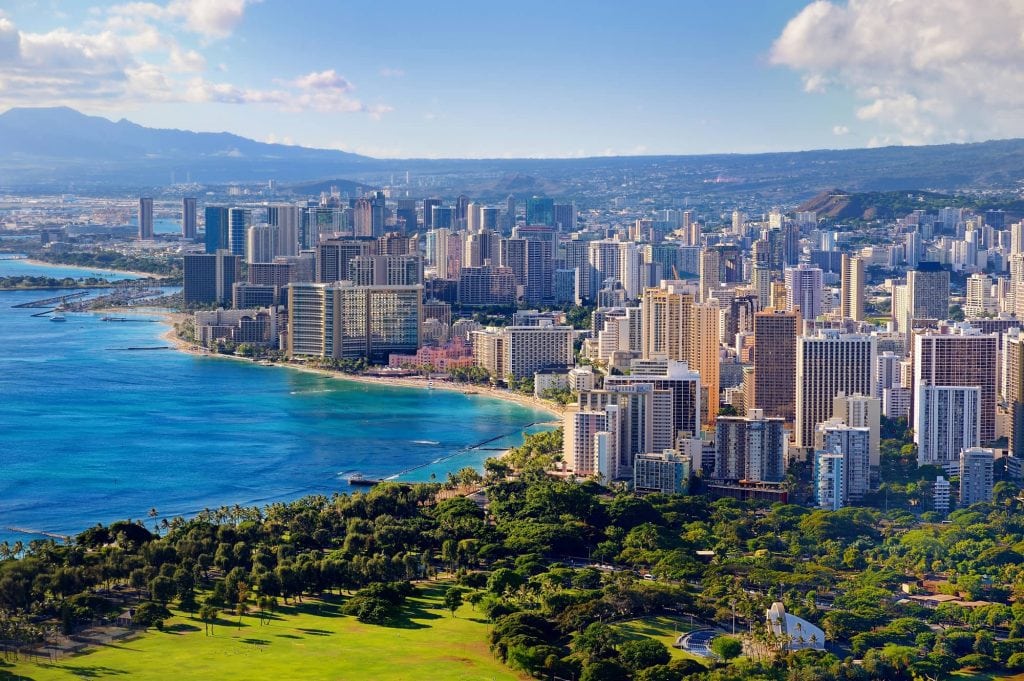
Oahu is also home to the North Shore, one of the best beaches for surfing in the entire world.
The cost of living in Oahu is high, but it offers a wide range of housing options, from luxury beachfront properties to more affordable options in suburban neighborhoods. Despite the high Oahu real estate market, Oahu’s vibrant job market, world-class amenities, and access to excellent public and private schools make it a popular choice for locals and newcomers.
Maui: The Valley Isle
Maui, also known as “The Valley Isle,” is the second-largest of the Hawaiian Islands and is renowned for its stunning landscapes, world-class beaches, and humpback whale sightings.
From the luxurious resorts in Kaanapali and Wailea to the historic town of Lahaina and the stunning landscapes of the Road to Hana, Maui offers an island experience that appeals to adventurers and those seeking relaxation.
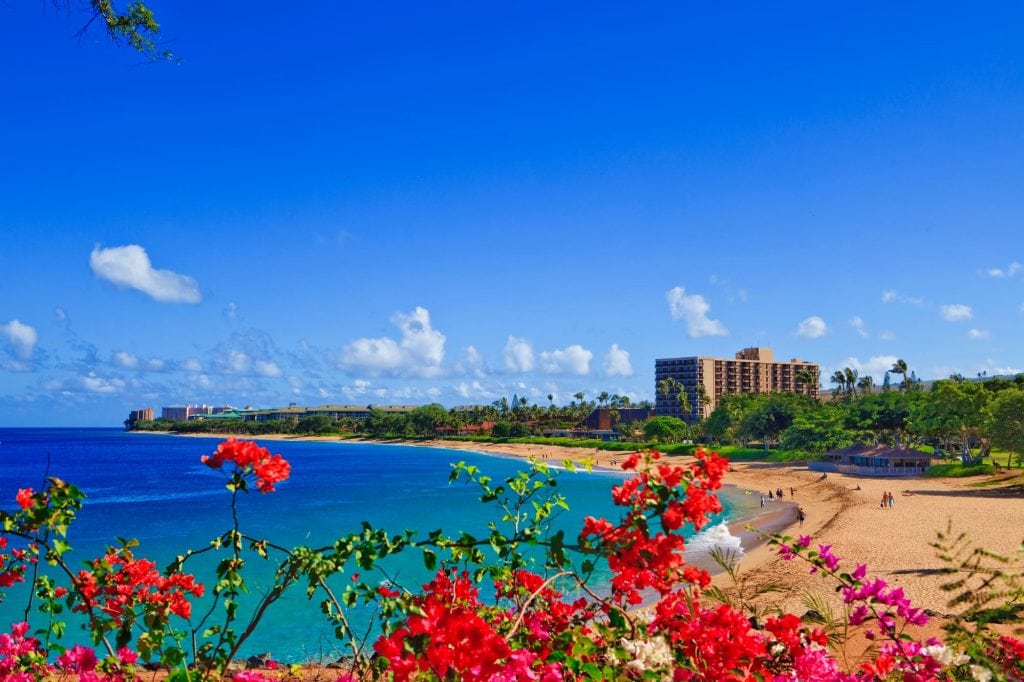
Maui provides a variety of cultural experiences, with opportunities to learn traditional Hawaiian hula, participate in luau festivities, or delve into the island’s historical past. The unique balance of nature, culture, and luxury on Maui makes it a place that truly caters to every taste.
While the cost of living in Maui is higher than the national average, the trade-offs include access to top-notch amenities, including excellent restaurants, shopping centers, and outdoor recreational facilities.
The housing market in Maui varies significantly, with high-end beachfront properties in resort areas and more reasonably priced options in upcountry and central Maui. Maui’s robust tourism industry also provides a wealth of job opportunities.
Kauai: The Garden Isle
Kauai, fondly known as “The Garden Isle” for its lush, green landscapes, is the perfect choice for nature lovers and those seeking a laid-back lifestyle. The island is home to the breathtaking Napali Coast, Waimea Canyon, and numerous stunning waterfalls. Kauai’s natural beauty is unparalleled, offering a range of outdoor activities from hiking and biking to surfing and snorkeling.
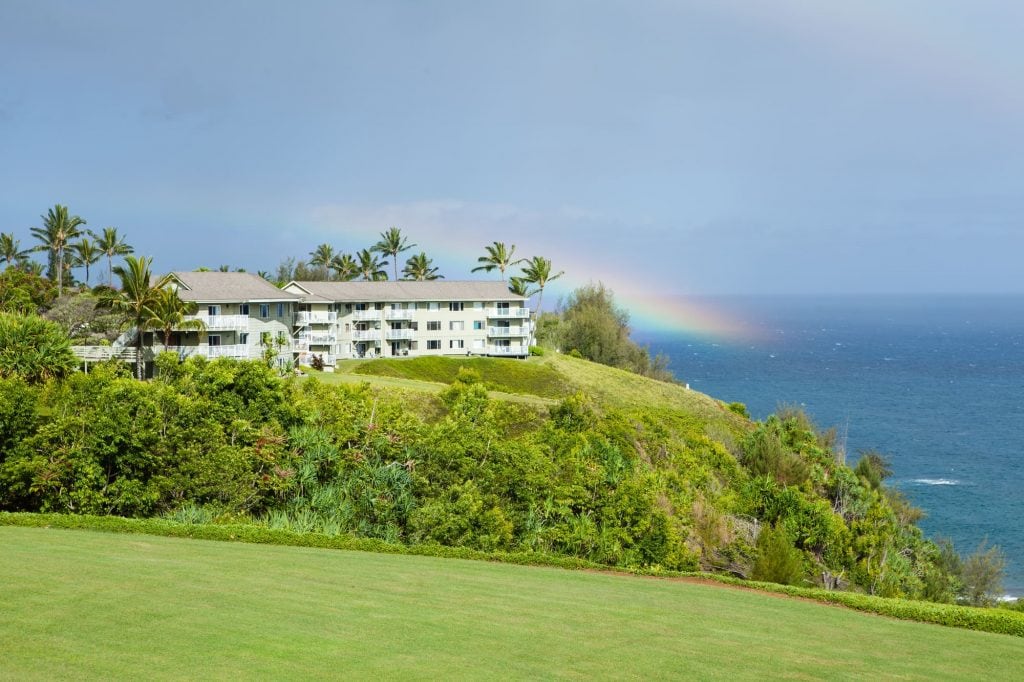
Kauai’s living cost is less than that of Oahu and Maui but still higher than the national average. Housing costs vary significantly based on location and property type, with options ranging from luxury resorts to more affordable residential areas.
In Kauai, you will also find a sense of community that permeates the island, along with a deep respect for nature and the land. This respect gets reflected in the island’s commitment to sustainability, with many Hawaii residents and businesses prioritizing eco-friendly practices.
While job opportunities on Kauai are somewhat limited, particularly compared to Oahu, the tourism industry is the primary employer, along with agriculture and civil-related jobs. Local amenities, including shopping centers, restaurants, and schools, cater to the island’s residents well.
Hawaii: The Big Island
Hawaii Island, commonly called “The Big Island,” is the largest and youngest island in the Hawaiian chain. This island is famous for its contrasting landscapes, which include snow-capped mountains, tropical rainforests, black sand beaches, and the active Kilauea volcano in Hawaii Volcanoes National Park.
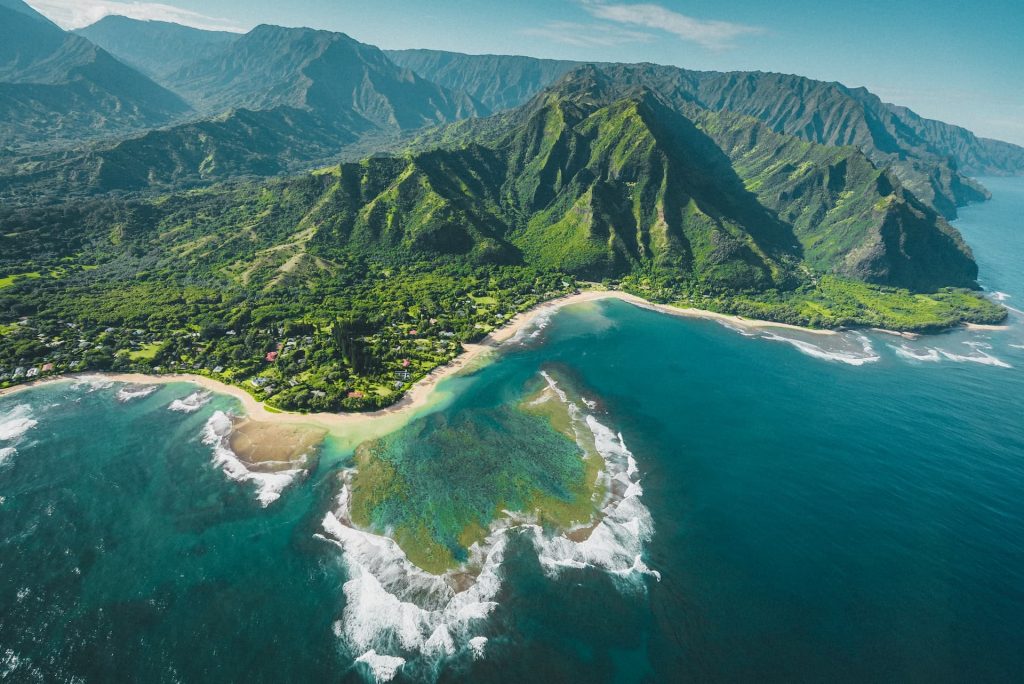
The Big Island offers a lower living cost than the other Hawaiian islands. The housing market is also more affordable, with a wide range of options from luxury estates to modest single-family homes.
On The Big Island, you can immerse yourself in the vibrant Hawaiian culture, attend traditional festivals, or explore historic sites. The rich diversity of landscapes also makes this island a fantastic place for outdoor enthusiasts, with countless hiking trails, beaches, and natural parks to discover.
The island has a diverse economy with job opportunities in tourism, agriculture, and renewable energy sectors. Residents have access to a variety of amenities, including shopping centers, restaurants, and both public and private schools.
Molokai: The Friendly Isle
Molokai, also known as “The Friendly Isle,” offers a small-town feel and a slower pace of life. With a strong sense of community, this island is ideal for those seeking a more secluded and tranquil lifestyle. Famous for its preserved Hawaiian culture, Molokai’s main attractions include the Kalaupapa National Historical Park and Papohaku Beach, one of the largest white sand beaches in Hawaii.
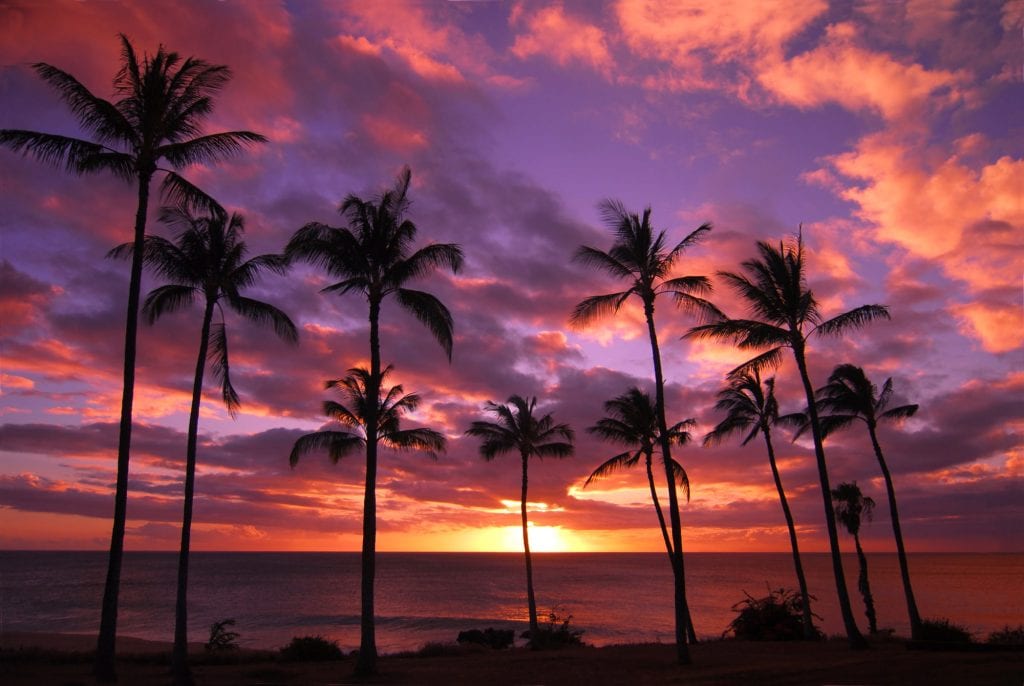
The cost of living on Molokai is relatively lower than the other major islands, and housing costs tend to be more affordable. However, job opportunities are limited, primarily focusing on tourism, healthcare, and agriculture. Despite its size, Molokai offers essential amenities, including grocery stores, restaurants, and schools, with most services concentrated in the main town of Kaunakakai.
Buying or Renting
Deciding between buying or renting a home in Hawaii depends on your circumstances, budget, and long-term plans. Both options have their merits and potential downsides. To make the right decision, you must consider factors such as the length of your stay, your financial situation, housing market conditions, and lifestyle preferences.
It’s also essential to consider your lifestyle preferences and personal needs. Some people prefer the flexibility and lower upfront costs of renting, while others value homeownership’s stability and potential financial benefits. You can make the best decision for your future in Hawaii by carefully evaluating your situation and seeking professional advice.
For instance, buying might be the best option if you plan to stay in Hawaii for a long time and have sufficient financial resources. But, if you’re unsure about your long-term plans or want to avoid home maintenance responsibilities, renting might be more suitable.
Buying Hawaii Real Estate
Purchasing a home in Hawaii can be a worthwhile investment, especially given the strong appreciation of property values over time. Buyers can build equity, enjoy potential tax benefits, and have a sense of stability and freedom to personalize their homes. However, buying a home comes with significant upfront costs, including a down payment, closing costs, appraisal fees, and, potentially, renovation expenses.
The Hawaiian real estate market is quite dynamic, with prices varying based on location, proximity to the beach, and other amenities. More expensive areas include Honolulu, Wailea in Maui, and Princeville in Kauai, while more affordable options can be found in Hilo and Puna on the Big Island.
Budgeting for often overlooked costs such as homeowner association fees, property taxes, home insurance, and maintenance costs is essential. Having a knowledgeable Hawaii real estate agent to guide you can make the buying process smoother.
Renting
Renting a home in Hawaii provides more flexibility, which can be particularly beneficial for island newcomers. Before committing to a property purchase, it lets you get a feel for the different neighborhoods and lifestyles. Renters also have fewer responsibilities as property maintenance and repairs are typically handled by the landlord.
On the other hand, rental prices in Hawaii can be steep, particularly in high-demand areas such as Waikiki, Honolulu, and beachside communities. Pay attention to the security deposit, potential parking fees, utilities, and renters’ insurance when considering rental costs. Rent increases are also a common concern in Hawaii’s competitive rental market.
Choosing a Real Estate Expert
When navigating the complex Hawaii real estate market, partnering with a local, experienced real estate agent is invaluable. They can provide insights into market trends, the best places to live in Hawaii, and property values and can help negotiate the best deal for you.
They also have an intimate understanding of the local culture and community, which can help you find a home in a neighborhood that fits your lifestyle and preferences. Remember, the right real estate agent is not just a transaction facilitator but a partner in your journey to a new life in Hawaii.
Scams
Avoid transferring money to unknown entities or individuals while negotiating property deals. Always ensure you’re dealing with a reputable and licensed real estate agent or property manager to stay safe from potential scams.
Understanding Cost of Living Differences From Mainland
Living in Hawaii offers a unique blend of natural beauty, rich culture, and a relaxed island lifestyle, but this comes with a higher cost of living compared to the mainland United States. Someone moving from San Francisco to Honolulu will certainly notice the difference.
One of the essential financial aspects to consider is your income source. If you’re relocating for work, it’s crucial to negotiate a salary that reflects Hawaii’s higher cost of living. Alternatively, if you’re retired or self-employed, you must ensure your income or savings can comfortably cover your expenses in Hawaii.
Everything from housing, food, and utilities, to transportation tends to be more expensive. Due to its remote location in the Pacific Ocean, many goods must get shipped in, increasing the price of groceries and consumer goods. Additionally, housing costs in Hawaii are among the highest in the nation. The median home price and rental rates are considerably higher than the national average.
Despite the higher costs, there are ways to adapt and make island life more affordable. Embracing the local lifestyle can help, such as shopping at local markets, eating local food, and taking advantage of the year-round mild climate to save on heating and cooling costs. Planning and budgeting accordingly are crucial to managing the cost of living differences when moving to Hawaii.
Seasons and Climate
Hawaii boasts a tropical climate, providing warm weather year-round, making it an outdoor lover’s paradise. The islands have two main seasons: the dry season (April to October), with average temperatures between 75 and 88 degrees Fahrenheit, and the wet season (November to March), which is slightly cooler, with occasional rain showers.
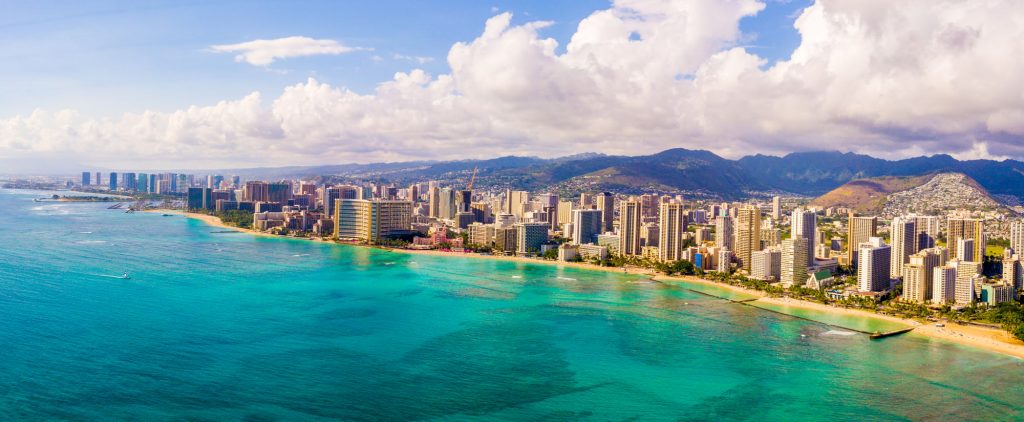
It’s also important to remember that each island has microclimates, meaning weather can vary significantly in different areas of the same island. For example, the east side of an island may receive more rain than the west coast, which tends to be drier. Understanding these climatic differences can help you choose a location that suits your weather preferences.
While Hawaii’s climate is generally mild and pleasant, the islands are susceptible to natural disasters like hurricanes, tsunamis, and volcanic activity, particularly on the Big Island. Residents should be prepared and familiar with emergency protocols for these events.
Benefits of Outdoor Lifestyles
Living the Hawaii life is synonymous with an outdoor lifestyle. The islands offer many outdoor activities, from surfing, hiking, and snorkeling, to exploring the breathtaking nature trails in Haleakala National Park or along the Napali Coast. This active lifestyle can contribute positively to physical and mental health, fostering a strong connection with nature and the community.
Hawaii’s outdoor lifestyle goes beyond recreational activities. The climate allows for year-round gardening, providing opportunities for growing your own tropical fruits, flowers, or vegetables. The ability to live sustainably is another appealing aspect of life in Hawaii, from solar energy options to rainwater catchment systems.
However, the outdoor lifestyle may also have its challenges. For instance, Hawaii’s strong sun means that sun protection is necessary, and residents must be prepared for sudden weather changes, especially when planning outdoor activities.
Further, surfing and hiking may require skills and fitness levels that new residents need to build up over time. Despite these considerations, the benefits and beauty of Hawaii’s outdoor lifestyle far outweigh the negatives for most residents.
Eating In and Out on the Islands
Eating on the islands uniquely blends vibrant local flavors and imported favorites. Hawaiian cuisine is a delicious fusion of Polynesian, Asian, and American influences, offering a wide range of mouth-watering dishes like poke, loco moco, and the iconic Hawaiian pizza. Dining out can range from casual food trucks and beachside shacks to high-end restaurants in Waikiki Beach or Maui’s resort towns.
Hawaii’s culinary scene has evolved to be inclusive for those with dietary restrictions or preferences. You can find a variety of vegetarian, vegan, and gluten-free options. Locally sourced and organic foods are also popular, reflecting the islands’ commitment to sustainability and health.
Grocery shopping in Hawaii, however, can be more expensive than on the mainland due to the cost of importing goods. Items such as milk, bread, and fresh produce often come at a higher price tag. While most everyday items are available, some specific brands or products might not be as easily found.
To keep costs down, residents often shop at local farmers’ markets, which offer fresh, locally-grown produce at reasonable prices.
Hawaiian Culture and Belonging
Hawaii is known for its ‘Aloha Spirit,’ a unique cultural ethos emphasizing love, peace, compassion, and mutual respect. When moving to Hawaii, embracing this cultural philosophy is essential and deeply ingrained in daily lives and interactions.
The Aloha Spirit isn’t just an abstract idea; it’s the foundation of local laws. Known as the “Aloha Law,” it stipulates that government officials must treat people with kindness, respect, and humility.
The islands are a melting pot of cultures, primarily influenced by Native Hawaiian, Asian, and American traditions. This rich cultural diversity is evident in everything from food, music, and language to festivals. Events such as the Merrie Monarch Festival, Aloha Festivals, and Lei Day provide an immersive experience of the local traditions and customs.
Apart from these, the islands are also known for their unique art forms like hula dancing, lei making, and slack key guitar music, which expresses the heart and soul of Hawaiian culture.
Understanding and respecting the local culture and customs is crucial to fitting in. Learning a few Hawaiian phrases, participating in local events, and practicing the Aloha Spirit can go a long way in becoming a part of the community.
Island Fever
Island Fever, or the feeling of being confined and isolated due to living on an island, can sometimes affect residents, especially those used to living in larger mainland cities. The slower pace of life, the geographical isolation, and the limited options for travel can sometimes feel limiting.
However, most residents find that the benefits of island living, such as the close-knit community, stunning natural beauty, and laid-back lifestyle, far outweigh these feelings over time.
Try adopting a perspective of appreciating the unique experiences that island living offers. These include enjoying panoramic sunsets, exploring diverse flora and fauna, and engaging in water sports.
Tourist Season
The tourist season in Hawaii, particularly from December through April and during the summer months, can significantly impact residents. During these periods, there may be an increase in traffic, prices, and crowds at popular sites, which can be a consideration for those moving to Hawaii.
For residents, this could mean more congested hiking trails or beaches. However, living in Hawaii allows you to enjoy these attractions during off-peak times when there are fewer tourists.
Finding Employment
Securing a job is an essential step when planning a move to Hawaii. Hawaii’s job market is fairly diverse, with significant sectors including tourism, healthcare, education, and government. In recent years, there’s been growth in civil-related jobs, renewable energy, and tech industries. Remote work opportunities are also on the rise, particularly due to the increased digitalization post-pandemic.
When looking for employment, consider the cost of living and ensure the salary will cover your expenses comfortably. It’s also advisable to secure a job before making the move, or at least have a solid plan in place for your job search.
Networking can be beneficial, as local connections often lead to job opportunities. Online job platforms, local job agencies, and industry-specific job boards can also be helpful resources.
Additionally, volunteering can provide a great way to make connections within the community and could potentially lead to job opportunities. Hopefully, these tips make your move to Hawaii as smooth as possible.
Driving and Importing a Vehicle
Driving is often necessary for day-to-day life in Hawaii, especially in areas with limited public transportation. If you plan on bringing your car from the mainland, you’ll need to consider the logistics and costs involved.
Importing a vehicle usually involves shipping it by sea in a container, which can be quite costly, with prices varying based on factors like the size of the vehicle and the shipping company you choose. It’s also important to note that the process can take a few weeks.
When you move to Hawaii, once your vehicle arrives, it must be registered within 30 days. You must complete a vehicle inspection to ensure it meets local safety and emission standards. As for driving in Hawaii, the traffic rules are generally similar to the rest of the U.S. However, familiarizing yourself with specific local regulations is always a good idea.
Car insurance is a must in Hawaii. The state has specific minimum coverage requirements, so ensure your policy meets these.
Other Considerations About Moving to Hawaii
When planning a move to Hawaii, it’s crucial to prepare for the shift in the pace of life, often referred to as “island time,” which may require an adjustment if you’re used to a more hurried mainland lifestyle.
Also, be prepared for a change in your daily routines, including shopping at a local Chinese market instead of supermarket chains or spending weekends exploring breathtaking nature instead of visiting Hawaii’s urban centers.
Schools in Hawaii
Education in Hawaii is diverse, with a mix of public, private, and charter schools serving students from pre-K through 12th grade. The state also has several post-secondary institutions, including the University of Hawaii system, comprising three universities and several community colleges.
Hawaii’s schools are known for their strong emphasis on cultural education and integrating Native Hawaiian cultural practices into the curriculum.
The curriculum’s holistic approach focuses not just on academic achievement but also on the development of character and well-being, connecting students with their community and natural environment.
Healthcare
Healthcare in Hawaii is of a high standard, with a robust network of hospitals, clinics, and healthcare providers. The state has several acute care hospitals, emergency care facilities, and a wide range of specialists.
Hawaii also has a Prepaid Health Care Act, which requires employers to provide health insurance to employees who work more than 20 hours per week, making it one of the states with the highest insured rates in the U.S.
Hawaii also has community health centers spread across the islands, providing care on a sliding fee scale, making healthcare more accessible.
Moving Pets to Hawaii
Due to the state’s strict quarantine laws to protect the islands from invasive species and diseases, bringing pets to Hawaii involves a specific process. Hawaii is rabies-free, so there is a mandatory quarantine period for pets.
However, Hawaii does have a “5-Day-Or-Less” program that can reduce quarantine time significantly, provided you meet certain criteria and preparations before your pet’s arrival.
For this, pet owners must complete the necessary vaccinations and tests several months in advance, emphasizing the need for early planning when relocating with pets to Hawaii.
Taxes
Living in Hawaii means dealing with a unique tax situation. The state has some of the highest tax rates in the United States, but it only applies to some income sources. The General Excise Tax (GET), similar to a sales tax, affects nearly all transactions, whether goods or services.
Furthermore, property taxes in Hawaii are relatively low, but income tax rates can be high, especially for higher earners.
Hawaii does not tax certain types of income, such as Social Security benefits or certain types of pension income, which can benefit retirees.
Island Life
Adapting to the island life in Hawaii means embracing the local culture and traditions, which blend Native Hawaiian, Asian, and Western influences. Learning some Hawaiian language phrases, participating in cultural events, and making friends within the community can all help ease the transition.
Hawaii’s outdoor activities, from surfing and hiking to attending beachside luaus, provide ample opportunities for socializing and integrating into the local lifestyle. Enjoying the island lifestyle is all about respecting the land, the culture, and the pace of life.
Another aspect of island life is the abundant farmers’ markets offering fresh, locally-sourced fruits, vegetables, and handmade crafts. These markets also act as social events, offering a chance to interact with the local community.
Banking on the Island
Banking in Hawaii is relatively straightforward, with a mix of local banks, credit unions, and branches of mainland U.S. banks.
It’s advisable to consider a bank with numerous ATMs and branches on your island to ensure easy access to your finances. Most banks also offer online banking options for even more convenience.
Being Connected
Despite its isolated location, Hawaii has reliable internet and phone services. Major U.S. mobile phone carriers provide coverage throughout the islands, although remote areas may have weaker signals.
As for the internet, several broadband providers are available, ensuring that residents can stay connected whether for work or keeping in touch with family and friends on the mainland.
Spiritual Life
Hawaii is known for its diversity, and this extends to its spiritual life. The islands are home to various religious communities, including Christian churches, Buddhist temples, and Shinto shrines. Additionally, numerous spiritual retreats and events celebrate Hawaii’s rich tapestry of faiths and spiritual traditions.
Finding a Moving Company
Choosing a reliable moving company is crucial for a smooth transition to Hawaii. Look for companies with experience in island movings, as they’ll understand the logistics involved in transporting your belongings over such long distances.
Get quotes from multiple companies and pay attention to reviews and ratings. Remember that moving to Hawaii can take several weeks due to the distance, so plan your timeline accordingly.
Overall Pros and Cons
The decision to move to Hawaii comes with its unique pros and cons. On the positive side, you’ll enjoy beautiful weather, abundant natural beauty, a laid-back lifestyle, and a rich, diverse culture.
However, you’ll also want to consider the high cost of living, the potential for island fever, the distance from the mainland, and the potential impact of natural disasters. But with careful planning and a flexible attitude, these challenges can be managed and even turned into opportunities for growth and new experiences.
Other Considerations
Other considerations when moving to Hawaii include understanding the local customs and respecting the island’s rich cultural heritage. It’s also crucial to be prepared for a slower pace of life, often called “island time.” Lastly, consider your access to amenities and facilities, which can vary significantly from one island to another, particularly if you’re considering living in a more remote area.
FAQs: Moving to Hawaii
Moving to Hawaii raises a myriad of questions. We’ve compiled frequently asked questions to provide a more comprehensive picture of what moving and living in Hawaii entails.
Is it realistic to move to Hawaii?
It is realistic to move to Hawaii, but it requires careful planning and preparation. Considerations include the high cost of living, distance from mainland family and friends, and adjustments to a different pace of life and culture.
How much money would it take to move to Hawaii?
The cost of moving to Hawaii depends on several factors, such as your location, the volume of household goods, and the specific moving service you choose. It could range from $5,000 to $15,000. Remember, this is just the moving cost and does not account for housing and living expenses in Hawaii.
How do I move to Hawaii permanently?
Moving to Hawaii permanently involves several steps: securing employment, finding a place to live, shipping your belongings and potentially your vehicle, understanding and adjusting to the cost of living, and acclimating to the local culture and lifestyle. It’s also important to consider factors like health care, education, and pet quarantine laws if you bring a furry friend.
Is it hard to get a job in Hawaii?
Finding a job in Hawaii can be challenging due to the high competition and the relatively small job market, especially compared to mainland states. Tourism, healthcare, education, and civil services jobs are more common. It is highly recommended to secure a job before making the move.
What is the minimum wage in Hawaii?
The minimum wage in Hawaii is $10.10 per hour. However, the cost of living in Hawaii is significantly higher than the national average, which means this wage might not provide a comfortable standard of living.
Is it cheaper to live in Hawaii or California?
While both Hawaii and California are among the states with the highest cost of living in the U.S., Hawaii is generally more expensive. That is due to the high cost of housing, groceries, and other goods and services often imported, resulting in added costs.
Do you need a car to live in Hawaii?
Whether you need a car in Hawaii depends on the island and your lifestyle. Public transportation options are available on larger islands like Oahu, and towns and cities are relatively close together. However, having a car could be beneficial if you live on a smaller island or prefer to explore the island’s natural beauty at your leisure.
What is the cheapest island to move to in Hawaii?
Among Hawaii’s main islands, the Big Island tends to be the cheapest in terms of housing costs. However, each island has its cost variations depending on factors such as proximity to amenities, so it’s crucial to do thorough research.
Final Thoughts on Moving to Hawaii
Moving to Hawaii offers a unique lifestyle, surrounded by stunning natural beauty and a warm climate. However, it’s essential to consider the complexities, such as the cost of living, housing, and adjusting to the island lifestyle.
If you’ve taken everything into account and decided that Hawaii is the paradise you’ve been dreaming of, don’t hesitate to search for properties in your desired island. You can also contact a local eXp agent to help you find your perfect home and successfully relocate to Hawaii. Aloha!
